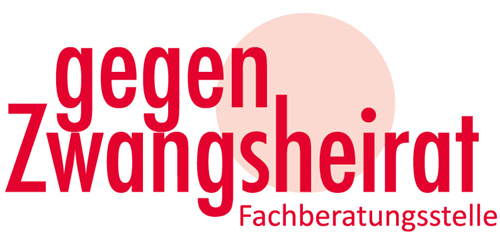Legal aspects
- Public International Law
- Constitutional Law
- Civil Law
- Criminal Law
- Youth Welfare Service Law
- Residence Law
- Act for the Protection against Violence
In order to simplify the evaluation of the situation of the girls and young women concerned, it is helpful to learn something about the legal situation. This page offers you a first survey of individual legal provisions from different fields of law.
On 17th March 2011, the Bundestag passed a law to combat forced marriage. In accordance with this law, forced marriage is recorded as a separate and independent offence in the Penal Code (§237 StGB).
The adopted changes are mainly found within „Strafrecht (Criminal Law)“ and „Aufenthaltsgesetz (Residence Law)“.
For further information, please contact the online counselling service or consult a lawyer.
Public International Law
According to article 16 paragraph 2 of the General Declaration of Human Rights of 1948, a marriage may only be celebrated due to the free and full mutual consent of the future spouses.
Therefore, a forced marriage is a violation of human rights.
Constitutional Law
Everybody has the right to self-development, unless he/she violates any rights of others, and unless he/she violates the constitutional order or the moral law. The freedom of a human being is inviolable (article 2 of Grundgesetz – GG [constitutional law]).
Human dignity is inviolable (Article 1 of GG [constitutional law]).
The law is no respecter of persons. Both men and women have equal rights. It is the task of the state to promote the actual implementation of gender mainstreaming. In addition to that, the state works towards the removal of existing disadvantages (article 3 of GG).
As a consequence, a forced marriage is not admissible according to the Grundgesetz [constitutional law] of the Federal Republic of Germany.
Civil Law
With a marriage, not depending on the citizenship, exclusively those acts, applicable in the country where the marriage was celebrated, are considered in general. According to German law, a marriage is an arrangement according to family law, requiring the freewill of both spouses (§§ 1210 ff Bürgerliches Gesetzbuch – BGB [German Civil Code]).
According to § 1303 paragraph 1 BGB, a marriage must not be celebrated before the spouse have achieved the age of consent. If a spouse is under age when the marriage is celebrated, only the Familiengericht [domestic relations court] may make the decision, whether the persons concerned are released from this requirement; the parents, however, are not allowed to do so (§ 1303 paragraph 2 of BGB).
A forced marriage can be cancelled within a one year’s term after the celebration of such marriage by means of a sentence, if a constraint, due to which the marriage took place, can be proved. After expiration of the term, the marriage will be divorced as a consequence.
Criminal Law
On 17 March 2011, the Bundestag passed a law. In accordance with this law, forced marriage is recorded as a separate and independent offence in the Penal Code (§ 237 StGB).
Anyone who forces a person to marry can be punished with a prison sentence of between six months and five years (§ 237 StGB).
The application deadline for the annulment of a forced marriage, in the Civil Code, has been extended from one to three years (§ 1317, paragraph 1 sentence 1 BGB).
Youth Welfare Service Law
Children, youths and young persons of full age may contact the local Jugendamt [youth welfare office] for help. Only those foreign children, youth and/ or young people of full age who are authorised to live here in Germany, due to e.g. an exceptional leave to remain, are authorised to benefit from the performances offered by the youth welfare service.
Without notification of their parents, children and youths may only be advised by the Jugendamt [youth welfare office], when counselling is required due to distress, and as long as the notification of the parents would impede the purpose of counselling. (§ 8 paragraph 3 Sozialgesetzbuch (SGB) [Social Code] Achtes Buch (VIII) [eigth book].
If children or youths ask for custody or if an intermediate danger requires the safe accommodation for the child’s/ youth’s welfare, the Jugendamt will be obliged to arrange for custody. Children and youths may also be entrusted in the youth office’s care without their parents’consent, i.e. accommodated with suitable persons or institutions, if their protection is not guaranteed otherwise. If the parents disagree with custody, the Jugendamt will have to apply for a decision to be made by the local court (§ 42 SGB VIII).
If the Jugendamt has been informed about important evidence for the threat to the welfare of a child or a youth, several specialists of the Jugendamt have to evaluate the risk together. The persons, having the care and the custody of the child/ youth, as well as the child or the youth have to be involved, as far as the effective protection of the child or the youth is not challenged. If the Jugendamt is of the opinion that the domestic relations court must be involved, the Jugendamt has to contact that court; this also applies, if the persons, having the care and the custody of the child, are neither willing nor in a position to participate in the evaluation of the risk. If there is an urgent danger and the decision of the court cannot be awaited, the Jugendamt will be responsible for custody (§ 8 a SGB VIII).
On application, young people of full age shall be offered assistance for their self-development an self dependent conduct of life, when and as long as that assistance is required due to the individual situation of such young human being. In general, the assistance is only granted until the age of 21; in well-founded individual cases, however, it is to be continued for a limited period of time (§ 41 SGB VIII).
Often, young women are not accommodated in institutions, belonging to the youth welfare service, but in women’s refuges. This may lead to problems, if eighteen to twenty-one years old women are not able to meet the requirements of the women’s refuges with regard to autonomy and self-reliance.
Residence Law
Due to a forced marriage the status of girls and young women living here in Germany does not automatically change with regard to their right of residence. However, if the legal residence is derived from the spouse’s situation, after three years of marriage an independent right of residence, not depending on the marriage, will be generated; in case of particular severity a renewal of the residence permit is possible even beforehand (§ 31 AufenthG-Aufenthaltsgesetz [residence law].
According to the new law passed by the Bundestag in June 2007 (§27 paragraph 1 a number 2 AufenthG), there is no right of residents to be joined by their partner and/ or children in Germany, if it is proved that one of the spouses was forced to the marriage.
Foreign nationals, who are victims of forced marriages and were prevented from returning to Germany, may, under certain circumstances, lawfully return independently. The deadline to file an application for a residence permit is 10 years after the date of departure. The application must be filed during this period and within three months of the removal of the predicament. (§ 37 para 2 of the Residence Act and § 51, para 4 of the Residence Act).
Included in the law is an increase in the minimum duration of the marriage required, in order to obtain an independent residence permit, from two to three years (§ 31 of the Residence Act).
According to § 37 AufenthG, minor foreigners, having their legal, usual place of residence in the Federal Republic of Germany, do have the right to return to Germany.
Act for the Protection against Violence
Under certain circumstances, decisions according to the act for the protection against violence can be applied for, if somebody unlawfully harms/ violates the body, health or freedom of another person or threats him/ her to do so (§ 1 GewSchG). This act can also be applied in those cases where forced marriage has already taken place or persons from the personal environment and/ or other environment of the girl and/ or woman concerned threat such girl and/ or woman.






